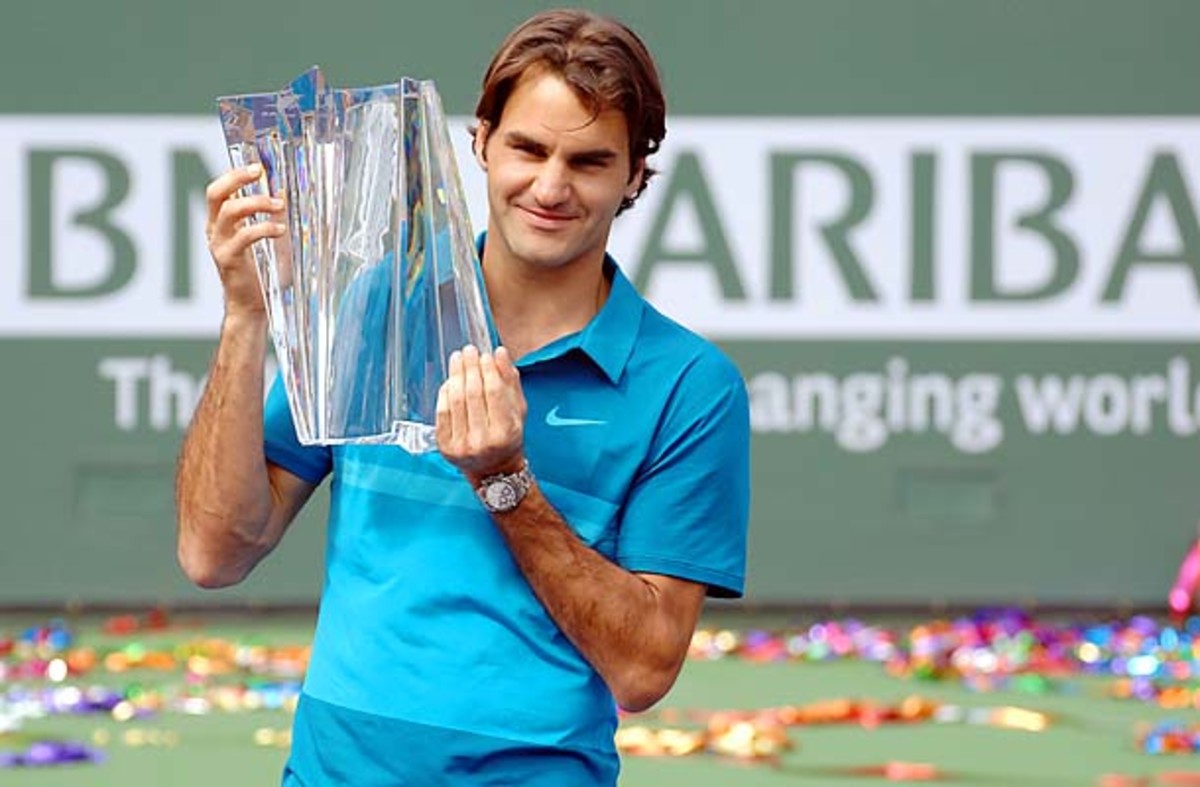
It's tournament versus ATP board in Indian Wells prize money dispute
Roger Federer won the BNP Paribas Open and a $1 million check last year. (John Cordes/Icon SMI)
Raymond Moore, CEO of the BNP Paribas Open in Indian Wells, is not optimistic the ATP Tour will reverse its decision to decline the tournament's offer of an $1.6 increase in prize money (split between the men and women) this year because other tournament representatives do not want the BNP Paribas Open to outpace them.
“We thought it was a slam dunk. The players approved it unanimously and the distribution formula we offered," Moore said during a Q&A session on MyDesert.com.
The ATP player representatives did approve the increase, as did the WTA Board of Directors, but the three tournament representatives on the ATP Board of Directors -- Mark Webster, Gavin Forbes and Charles Smith --- did not. Moore suspected it's because they don't want to give the players any more leverage to ask for prize money increases at other tournaments.
“There’s an inherent conflict of interest with the tournament reps," Moore said. "Why would the tournament reps want to block it? They want to put the muzzle or the bridle on Indian Wells or the BNP Paribas Open, so we don’t outdistance our fellow tournaments throughout the world. I can’t think of another reason why they would block it.
"All we're trying to do is make our tennis tournament the very best in the world. My opinion is that the tournament representatives on the ATP Tour want to hold us back a little bit. They're afraid of the Larry Ellison element [Ellison has owned the tournament since 2010]. What are these guys down in Indian Wells really going to do? Hopefully I eat my words next week, and it'll cost us $1.6 million more."
Aside from the overall prize money issue, the ATP board also takes issue with the tournament's decision to split the prize money between singles and doubles 82-18 as opposed to 80-20. Moore said the tournament's model simply reflects the current market. Under an 80-20 split, the doubles winners on the ATP side would make $250,000 as a team, which is more than what a singles semifinalist would make.
"We love doubles," he said. "We want to present it. We just don't think the increases justify it."
Raymond Moore said the BNP Paribas Open will decrease its prize money if the ATP board doesn't allow a $1.6 million increase. (Kevork Djansezian/Getty Images)
“Are you going to tell me that winners of the doubles should get more than semifinalists in singles," Moore told Tennis.com. "Frankly we don’t agree and that’s why we can abide by your prize money breakdown.”
As reported by Tennis.com, if the ATP board refuses to reverse course, Moore said the tournament will revert its prize money to 2011 levels of $4.5 million overall with the mandated nine percent increase for each of the last two years. The result is a $240,000 pay cut for the winners with significant decreases across the board in all rounds.
"We have a proposal and they can either accept it or reject it. We are going to go with whatever the tour rules and be good citizen, which doesn’t mean we have to like it. If they vote against it we are going to the minimum requirement, and the players are going to lose big time. Instead of offering $1 million to our singles winners, it will be $760,000, and instead of $11,000 to first-round losers, we are going to give $8,000. I think the players are going to go ballistic and they should.”
The move would mean the 2013 champions would actually make significantly less than last year. The way Moore is teeing it up, the blame would rest entirely on the ATP's tournament representatives. It's a bizarre dispute, especially during a time when the men have been clamoring for increased prize money for over a year. The BNP Paribas Open actually has the financial backing and fan support to give the players what they want, and it's the tournament's competition, i.e., other tournaments, blocking them.
“The driver for this is Mark Webster because the European tournaments don’t want to us progressing beyond what they can do. It’s totally anti-competitive. Everything he tells me is shallow and has no merit. There is division between players and tournament representatives on the board. The players keep asking for more and more and Webster said to me: ‘We are in the middle of prize money discussions about increases and we’re holding firm not to increase and then you do it. We have to keep the players in tow. It’s like land grab, give them your finger and they ask for the arm.’
“It’s an us and them, the tournament representatives against the players. They don’t want to go above what’s minimally mandated.”






